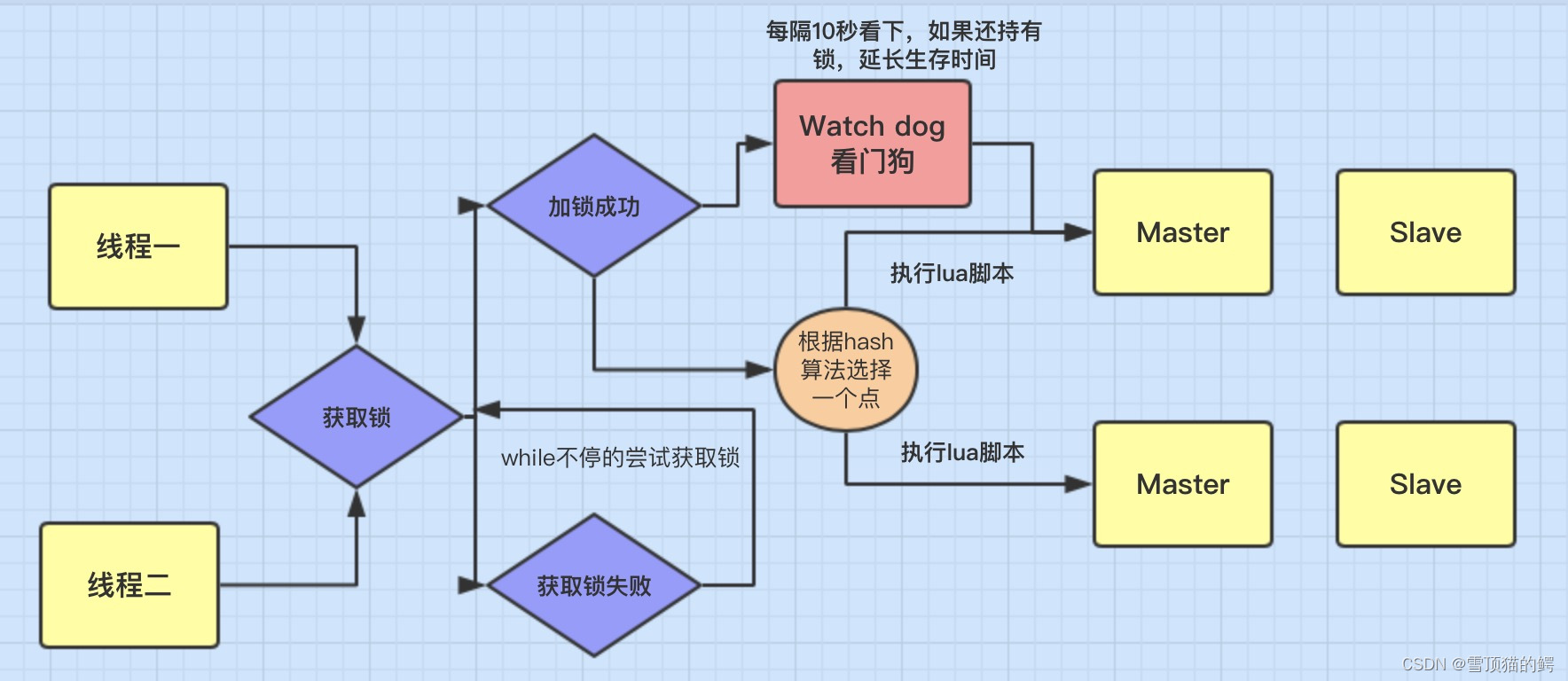
Redisson看门狗机制
网上redis分布式锁的工具方法,大都满足互斥、防止死锁的特性,有些工具方法会满足可重入特性。如果只满足上述3种特性会有哪些隐患呢?redis分布式锁无法自动续期,比如,一个锁设置了1分钟超时释放,如果拿到这个锁的线程在一分钟内没有执行完毕,那么这个锁就会被其他线程拿到,可能会导致严重的线上问题。既然存在锁过期而任务未执行完毕的情况,那是否有一种可以在任务未完成时自动续期的机制呢,几年前在redi
一、背景
网上redis分布式锁的工具方法,大都满足互斥、防止死锁的特性,有些工具方法会满足可重入特性。如果只满足上述3种特性会有哪些隐患呢?redis分布式锁无法自动续期,比如,一个锁设置了1分钟超时释放,如果拿到这个锁的线程在一分钟内没有执行完毕,那么这个锁就会被其他线程拿到,可能会导致严重的线上问题。
既然存在锁过期而任务未执行完毕的情况,那是否有一种可以在任务未完成时自动续期的机制呢,几年前在redisson中找到了看门狗的自动续期机制,就是解决这种分布式锁自动续期的问题的。

Redisson 锁的加锁机制如上图所示,线程去获取锁,获取成功则执行lua脚本,保存数据到redis数据库。如果获取失败: 一直通过while循环尝试获取锁(可自定义等待时间,超时后返回失败),获取成功后,执行lua脚本,保存数据到redis数据库。Redisson提供的分布式锁是支持锁自动续期的,也就是说,如果线程仍旧没有执行完,那么redisson会自动给redis中的目标key延长超时时间,这在Redisson中称之为 Watch Dog 机制
二、redisson 看门狗使用以及原理
1.redisson配置和初始化
pom.xml
<dependency>
<groupId>org.redisson</groupId>
<artifactId>redisson-spring-boot-starter</artifactId>
<version>3.16.4</version>
</dependency>
application.yaml
redis:
host: xxxxxxx
password: xxxxxx
max-active: 8
max-idle: 500
max-wait: 1
min-idle: 0
port: 6379
timeout: 1000ms
database: 0
redisson配置类
@Configuration
public class RedisConfig {
//最简单的redisson初始化配置
@Bean
public RedissonClient getRedisson() {
Config config = new Config();
config.useSingleServer().setAddress("redis://" + host + ":" + port).setPassword(password);
return Redisson.create(config);
}
}
2.redisson看门狗使用
使用redisson分布式锁的目的主要是防止分布式应用产生的并发问题,所以一般会进行一下调整改为AOP形式去进行业务代码解耦。这里会加入自定义注解和AOP。
@Target(ElementType.METHOD)
@Retention(RetentionPolicy.RUNTIME)
public @interface RedisLock {
//锁的名称
String lockName();
//锁的失效时间
long leaseTime() default 3;
//是否开启看门狗,默认开启,开启时锁的失效时间不执行。任务未完成时会自动续期锁时间
//使用看门狗,锁默认redis失效时间未30秒。失效时间剩余1/3时进行续期判断,是否需要续期
boolean watchdog() default true;
}
public class RedisLockAspect {
@Autowired
private RedissonClient redissonClient;
private static final String REDIS_PREFIX = "redisson_lock:";
@Around("@annotation(redisLock)")
public Object around(ProceedingJoinPoint joinPoint, RedisLock redisLock) throws Throwable {
String lockName = redisLock.lockName();
RLock rLock = redissonClient.getLock(REDIS_PREFIX + lockName);
Object result = null;
boolean isLock;
if(redisLock.watchdog()){
isLock =rLock.tryLock(0, TimeUnit.SECONDS);
}else {
isLock =rLock.tryLock(0,redisLock.leaseTime(), TimeUnit.SECONDS);
}
if(isLock){
try {
//执行方法
result = joinPoint.proceed();
} finally {
if (rLock.isLocked() && rLock.isHeldByCurrentThread()) {
rLock.unlock();
}
}
}else {
log.warn("The lock has been taken:{}",REDIS_PREFIX + lockName);
}
return result;
}
}
@Scheduled(cron = "*/10 * * * * ?")
//使用注解进行加锁
@RedisLock(lockName = "npa_lock_test",watchdog = true)
public void redisLockTest() {
System.out.println("get lock and perform a task");
try {
Thread.sleep(20000L);
} catch (InterruptedException e) {
e.printStackTrace();
}
}
这里使用定时任务进行模拟调用,10秒一次定时任务请求,线程执行睡眠20秒后完成。下面看一下执行结果。当获取锁后,第二次定时任务执行时。锁未被释放。所以失败,第三次获取时所已经释放,所以成功。
如果拿到分布式锁的节点宕机,且这个锁正好处于锁住的状态时,会出现锁死的状态,为了避免这种情况的发生,锁都会设置一个过期时间。这样也存在一个问题,加入一个线程拿到了锁设置了30s超时,在30s后这个线程还没有执行完毕,锁超时释放了,就会导致问题,Redisson给出了自己的答案,就是 watch dog 自动延期机制。
Redisson提供了一个监控锁的看门狗,它的作用是在Redisson实例被关闭前,不断的延长锁的有效期,也就是说,如果一个拿到锁的线程一直没有完成逻辑,那么看门狗会帮助线程不断的延长锁超时时间,锁不会因为超时而被释放。
默认情况下,看门狗的续期时间是30s,也可以通过修改Config.lockWatchdogTimeout来另行指定。另外Redisson 还提供了可以指定leaseTime参数的加锁方法来指定加锁的时间。超过这个时间后锁便自动解开了,不会延长锁的有效期。
3.redisson源码
Redisson的源码版本基于:3.16.4,同时需要注意的是:
watchDog 只有在未显示指定加锁时间(leaseTime)时才会生效。(这点很重要)
lockWatchdogTimeout设定的时间不要太小 ,比如我之前设置的是 100毫秒,由于网络直接导致加锁完后,watchdog去延期时,这个key在redis中已经被删除了。
在调用lock方法时,会最终调用到tryAcquireAsync。调用链为:lock()->tryAcquire->tryAcquireAsync,详细解释如下:
使用了RFuture(相关内容涉及Netty异步回调模式-Future和Promise剖析)去启动异步线程执行
private <T> RFuture<Long> tryAcquireAsync(long waitTime, long leaseTime, TimeUnit unit, long threadId) {
RFuture<Long> ttlRemainingFuture;
//如果指定了加锁时间,会直接去加锁
if (leaseTime != -1) {
ttlRemainingFuture = tryLockInnerAsync(waitTime, leaseTime, unit, threadId, RedisCommands.EVAL_LONG);
} else {
//没有指定加锁时间 会先进行加锁,并且默认时间就是 LockWatchdogTimeout的时间
//这个是异步操作 返回RFuture 类似netty中的future
ttlRemainingFuture = tryLockInnerAsync(waitTime, internalLockLeaseTime,
TimeUnit.MILLISECONDS, threadId, RedisCommands.EVAL_LONG);
}
//这里也是类似netty Future 的addListener,在future内容执行完成后执行
ttlRemainingFuture.onComplete((ttlRemaining, e) -> {
if (e != null) {
return;
}
// lock acquired
if (ttlRemaining == null) {
// leaseTime不为-1时,不会自动延期
if (leaseTime != -1) {
internalLockLeaseTime = unit.toMillis(leaseTime);
} else {
//这里是定时执行 当前锁自动延期的动作,leaseTime为-1时,才会自动延期
scheduleExpirationRenewal(threadId);
}
}
});
return ttlRemainingFuture;
}
scheduleExpirationRenewal 中会调用renewExpiration。 这里我们可以看到是启用一个timeout定时,去执行延期动作,
private void renewExpiration() {
ExpirationEntry ee = EXPIRATION_RENEWAL_MAP.get(getEntryName());
if (ee == null) {
return;
}
Timeout task = commandExecutor.getConnectionManager().newTimeout(new TimerTask() {
@Override
public void run(Timeout timeout) throws Exception {
ExpirationEntry ent = EXPIRATION_RENEWAL_MAP.get(getEntryName());
if (ent == null) {
return;
}
Long threadId = ent.getFirstThreadId();
if (threadId == null) {
return;
}
RFuture<Boolean> future = renewExpirationAsync(threadId);
future.onComplete((res, e) -> {
if (e != null) {
log.error("Can't update lock " + getRawName() + " expiration", e);
EXPIRATION_RENEWAL_MAP.remove(getEntryName());
return;
}
if (res) {
//如果 没有报错,就再次定时延期
// reschedule itself
renewExpiration();
} else {
cancelExpirationRenewal(null);
}
});
}
// 这里我们可以看到定时任务 是 lockWatchdogTimeout 的1/3时间去执行 renewExpirationAsync
}, internalLockLeaseTime / 3, TimeUnit.MILLISECONDS);
ee.setTimeout(task);
}
protected RFuture<Boolean> renewExpirationAsync(long threadId) {
return this.evalWriteAsync(this.getRawName(), LongCodec.INSTANCE, RedisCommands.EVAL_BOOLEAN, "if (redis.call('hexists', KEYS[1], ARGV[2]) == 1) then redis.call('pexpire', KEYS[1], ARGV[1]); return 1; end; return 0;", Collections.singletonList(this.getRawName()), this.internalLockLeaseTime, this.getLockName(threadId));
}
结论
- watch dog 在当前节点存活时每10s给分布式锁的key续期 30s;
- watch dog 机制启动,且代码中没有释放锁操作时,watch dog 会不断的给锁续期;
- 如果程序释放锁操作时因为异常没有被执行,那么锁无法被释放,所以释放锁操作一定要放到 finally {} 中;
- 要使 watchLog机制生效 ,lock时 不要设置 过期时间
- watchlog的延时时间 可以由 lockWatchdogTimeout指定默认延时时间,但是不要设置太小。如100
- watchdog 会每 lockWatchdogTimeout/3时间,去延时。
- watchdog 通过 类似netty的 Future功能来实现异步延时
- watchdog 最终还是通过 lua脚本来进行延时

开放原子开发者工作坊旨在鼓励更多人参与开源活动,与志同道合的开发者们相互交流开发经验、分享开发心得、获取前沿技术趋势。工作坊有多种形式的开发者活动,如meetup、训练营等,主打技术交流,干货满满,真诚地邀请各位开发者共同参与!
更多推荐
 已为社区贡献5条内容
已为社区贡献5条内容





所有评论(0)